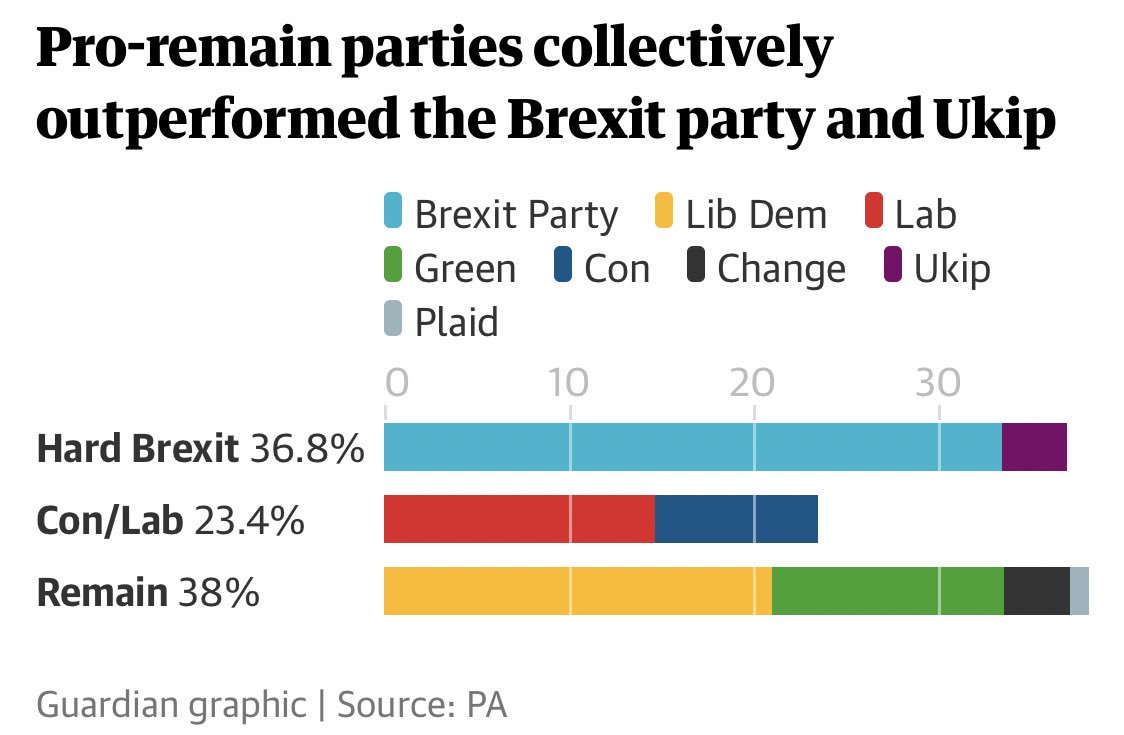Winning over 30% of seats, Eurosceptic parties and anti-establishment groups now control their largest bloc of votes since the first EU Parliamentary election in 1979.
Meanwhile, the long-ruling "grand coalition" of center-right and center-left parties (the EPP, a collection of center right parties, and S&D, a collection of center-left parties) lost its combined majority, though both coalition groups retained a plurality of seats (180, or 24%, for EPP, and 146, or 19.4%, for S&D).
Though pro-European groups together maintain a clear majority, this broad grouping has become increasingly fragmented, which could complicate policy making, while a strong showing from eurosceptics will mount a serious challenge to the status quo, according to a group of analysts from Deutsche Bank.
This shows us two things: first, the pro-European camp has definitely become more fragmented and could not prevent losing some seats to the Eurosceptics who dream if not (anymore) of the end of the EU at least of a substantially different one. Second, pro-Europeans group together will still hold a clear majority of two-thirds of the seats in the next EP. This means: policymaking for them will become more complex and require broader cross-party agreements and discipline. But Eurosceptics will not be able block decisions unless centrist pro-European parties fail to cooperate.
Typically, turnout in the EU Parliamentary race is lackluster, similar to that of a (typical) American midterm election. But this year, turnout surged to its highest level in decades: With a provisional turnout of 51%, the strongest in 25 years, electoral turnout broke the downward trend of the past decade (that's compared with 43% in 2014). However, differences in turnout were substantial across EU members, with the UK and Eastern European states recording the lowest turnount.
You will find more infographics at Statista
In the UK, which only opted to participate in the vote at the last minute as part of a can-kicking agreement with Brussels to extend the deadline for the UK's departure from the EU, Nigel Farage's Brexit Party won a plurality of votes (31.7%) - though liberal-leaning media outlets in the UK opted to spin the result as a victory for the "remain" camp, as the LibDems, Greens, SNP, Change UK and miscellaneous other parties won a combined 38%.
Despite being only four months old, Farage's Brexit Party emerged as one of the largest parties in the European Parliament (it's tied for first with Angela Merkel's center-right CDU/CSU, both with 29 seats). Merkel's CDU/CSU and SPU saw their support plunge below 29% and 16% respectively in their worst result in a national election.
Matteo Salvini's League Party came in second with 28 seats. Poland's Nationalist Law and Justice Party came in third with 23, while Marine Le Pen's National Rally Party won 22 seats, ahead of the 21 seats won by French President Emmanuel Macron's La Republique En Marche. Viktor Orban's Fidesz won 52% of the vote in Hungary, taking 13 of Hungary's 21 seats.
Though Sweden's Social Democrats remained the largest party in Europe, Sweden's anti-immigration Sweden Democrats won 15.4% of the vote, up from roughly 4% in the 2014 EU Parliamentary vote, growing their share of seats from two to three.
In Greece, Alexis Tsipras's Syriza was defeated by the center-right New Democracy Party, prompting Tsipras to call an early general election where New Democracy are expected to triumph. If that happens, it would end Syriza's four-year stint ruling Greece.
However, analysts are skeptical that the eurosceptic groups will be able to overcome partisan squabbling and work together to form a pan-European coalition - which is the only way to exercise real influence within the European Parliament. They will also lose some of their support when the UK finally leaves the bloc (if that ever happens), and the UK's 73 parliamentary seats are redistributed...
- Source, Zero Hedge, Read More Here

